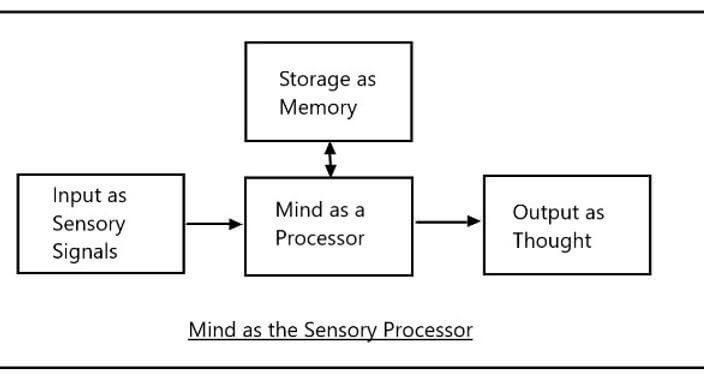Author: Randeep Singh / go to all Samkhya Karikas

Samkhya Karika 27 text:
Ubhayaatmakamatra manah sankalpakam-indriyam cha saadharmyaat |
Guna-parinaama-visheshaan naanaatvam baahya bhedaah cha ||
Ubhayaatmakam – possesses the nature of both (mind)
Atra – from among these (sense organs)
Manah – the mind
Sankalpam – understanding, determination
Indriyam – still it is a sense organ
Cha – and
Saadharmyaat – having common characteristics, nature
Guna parinaama – Changes, modiifications of the three guna
Visheshaan – unique, special
Naanaatvam – diversity, multiplicity
Baahya – external
Bhedaah – differences, diversities
Cha – and
Previous Samkhy karika had discussed the ten sense organs out of the eleven as stated in the Karika previous to that. Here, Samkhya Karika 27 separately elaborates upon the nature and characteristics of the eleventh sense organs, the mind, because it is a very unique, exquisite gift of nature which in reality behaves like a sense organ.
Mind functions as both, Jananedriyas and Karmendriyas
The mind, though a organ of determination and deliberation on whatever information the respective sense organs feed it with, is considered a sense organ itself because it exhibits the nature, charcteristics of both the types of sense organs: Jnanendriyas (organs of knowing) as well as the Karmendriyas (organs of action).
The sensations received by the mind from the sense organs are converted to direct perceptions. This means that mind (manas) gives meaning to these sensations which it constantly receives from the sense organs. It is more like a book being shown to a newly born child, the child can receive the basic signals of color and shapes present on the page, being shown, but since its mind lacks the capacity to deliberate on these signals it cannot impart meaning to these.
Thus, the mind has a property of Sankalpa, faculty of knowing and comprehending, which imparts meaning to the signals coming from the sense organs. The skill of Sankalpa as possessed by the mind will help the individual comprehend what the signals signify. Now, the quality of Sankalpa, knowing, or delebration, will depend on the modifications of the mind active at that moment due to the ever changing three gunas it is composed of. If the mind is in a Sattvik modification it will comprehend the signals from the senses in the light of positivity, and so on.
The function of the mind is just to know, comprehend the information coming from the sense organs, it will not try to rationalize or understand the signals so received. Rationalization and understanding is the function of Buddhi, the intellect. From the possibly multifarious meanings of the Sanskrit word ‘ Sankalpa’, like resolve, this Sankhya Karika means ‘the thought’ which is prone to, and exhibit the nature of the modifications of the mind at a given moment. Thought is actually the piece of energy, (prana) which has taken a particular form, under the influence of a particular state of mind (modification), after a sensory signal has been imparted a particular meaning by the mind.
So, Sankalpa is actually the ability of the mind which turns neutral signals emanating from the sense organs into meaningful thoughts. Since thoughts take the color, quality, of the state of the mind at a particular moment, it has the ability to imagine, ideate something which the signal being sent is not in reality. Imaginative ability, a modification of the mind, of the thought adds emotions, feelings, and psychic colors to the meaning of the signal received. Thoughts once created, with all its qualities, can remain engrained within the mind for long and can remerge on receiving appropriate stimulation, this is the attribute of memory of the mind.
Since the mind comprehends the signals received from the Jnanedriyas as well as the Karmendriyas without any distinction it is considered to have the nature of both. Moreover, the mind is subtler in construct, lacking material existence like brain, than all the other ten sense organs. The mind generates direct perception from the signals received from the five Jnanendriyas (organs of perception) and converts these perceptions into direct action through the Karmendriyas (organs of actions).
Buddhi must Supersede the Mind | Samkhya Karika 27
Our mind and intelligence (Buddhi) are such that they get entangled in whatever attractive things they see. We have not made efforts to think differently so as to control the senses. To rein in the mind is easy, but we have not strived for it. We have accumulated many undesirable things inside us. We need to remove them in order to try and control the senses and keep the mind steady. Slowly and gradually try to enhance your control on your mind. Till now, maybe we have not tried, and, hence, keep suffering for not having made the effort.
Whatever mind creates, thoughts, is conditioned by the ego (ahamkara) as ‘ I know’, or ‘I create’. This is in turn regulated by Buddhi, the rationale and understanding faculty where one can discern and integrate bhavas into one’s thinking to influence the corresponding action. To control the senses by mind is much superior to suppress the senses but continue to think about them which is nothing but hypocrisy. Mind is mightier than the senses, intelligence (buddhi) is mightier than the mind, and spirit or soul or consciousness is mightier than the intelligence. Therefore, with discriminative knowledge, mind and its fickleness can be controlled.
The presence of the diversity of the objects of perception in the material world around and the presence of multiple sense organs create differences and diversity in the perception of these external objects by the mind. Arjuna, the Pandava prince, observed that the mind is fickle yet very powerful and it is as difficult to rein in the mind as it is to rein in the wind. In reply, Lord Krishna said “Undoubtedly, controlling the mind is difficult but through practice and detachment (abhyasa and vairagya) it is possible”. Practice of yoga can fructify only through a restrained mind.
